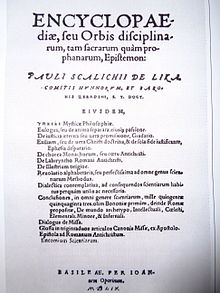Pavao Skalić
Pavao Skalić , also Paul Skalich, Paul Scaliger, latinized: Paulus Scalichius [also: Scaligius] de Lika , alleged "Prince de la Scala" (1570), "Count of Hun and Lycka" (1571), "Margrave of Verona" ( * 1534 in Zagreb ; † 1575 in Danzig ), was a Croatian humanist , priest , adventurer, encyclopedist and polymath.
He was also a follower of Ramon Llull and the author of the first work, in whose title the word " encyclopedia " occurs in today's meaning. The suffix “de Lika” can mean that his family comes from the Croatian region of Lika .
Skalić was a canon in Münster , and together with the theologian Johann Funck, he had a great influence on Duke Albrecht I of Brandenburg-Ansbach and became wealthy as a result. Intrigues and differences of opinion on religious issues with the King of Poland led to Funck's execution and Skalić's flight. His property was confiscated.
Live and act
Pavao Skalić was the son of a rural schoolmaster Michael Jelenchych in Zagreb (Agram). After his father's death, his mother moved with him to Laibach and remarried there. With a scholarship from the Bishop of Ljubljana, Urban Textor, Pavao Skalić went to Vienna in 1547, where he studied theology at the university, obtained his master's degree in 1551 and his doctorate in Bologna in 1552 . After returning to Vienna, Emperor Ferdinand I appointed him court chaplain and coadjutor of the Bishop of Ljubljana. In 1557 he was expelled from Vienna for fraud and went to Tübingen, where he came into contact with Primus Truber , Pietro Paolo Vergerio and Ungnad von Weissenwolff . He declared his conversion to the Lutheran faith and, on the basis of his mother's name, pretended to be a descendant of the princely family of the Scaliger of Verona. Equipped with the recommendations of various scholars and nobles, he traveled in 1561 to Duke Albrecht of Prussia in Königsberg , whose trust he won and whose adviser he became. The Prussian nobility became suspicious of Skalić's great influence on the duke and in 1565 turned to the King of Poland as an overlord. Skalić fled to Gdansk and from there to Paris. Eight was imposed on him in the Duchy of Prussia . From Paris he returned to Munster, where he again turned to the Catholic faith and married the Danzig housekeeper and bourgeois daughter who accompanied him, Anna Fege. In Munster he won the favor of the bishop, made new connections to Prussia, and with the help of some Polish noblemen, especially Bishop Stanisław Karnkowski , he was rehabilitated by the new Polish King Heinrich von Valois in 1574. Skalić went to Danzig, where he started negotiations with the new Duke of Prussia Albrecht Friedrich about the return of his goods. This did not happen, however, as Skalić died at the age of 40 or 41.
His first printed work was Conclusiones in omni genere scientiarum (conclusions in all directions of science) in 1553 . With this Pavao Skalić showed the ambitions of a polymath .
In Latin he wrote theological, philosophical, occult , historiographical and polemical writings, among other things .
In the title of his work Encyclopaediae seu orbis disciplinarum tam sacrarum quam profanarum epistemon , which was published in Basel in 1559, he used the term "encyclopedia" as one of the first to use it today.
Views
In philosophy, he took the view that God gave man wisdom. Philosophy is also a mystery (" misterij "). The soul is a "clean act" (Latin: actus purus ), immaterial and not for sale.
Works
Skalić's Encyclopaediae, seu orbis disciplinarum tam sacrarum quam prophanarum epistemon (roughly "E., or Compendium of theological and profane sciences" ) appeared in 1559 . Furthermore, he wrote, in addition to theological and philosophical works, a. a. the musical treatise Dialogus de Lyra ( Cologne , 1570).
In his encyclopedia he divides the sciences ( disciplinae ) first into philosophy and theology and divides the former:
Philosophy:
- the supernatural, also called metaphysics or first philosophy
- the natural (natural philosophy) with medicine and physics
- mathematics with arithmetic, music, geometry and Sphaerica
(the latter with Calculatoria, Geodesia, Canonica, Astrologia, Optica, Mechanica ) - the moral with economics and politics
- the rational with grammar, history, dialectics, rhetoric, poetics
See also
literature
- Gerta Krabbel : Paul Skalich: a life picture from the 16th century . Münster: Borgmeyer 1915 (Diss. Univ. Münster )
- Ulrich Dierse: Encyclopedia . Bouvier, Bonn 1977, p. 11
- Pavao Skalić = Paulus Scalichius: Epistemon: latinski i hrvatski . Priredila, uvod i komentare sast. Mihaela Girardi-Karšulin. Inst. Za Filozofiju, Zagreb 2004, ISBN 953-7137-00-7
- Ludwig Theodor Elze : Skalich, Paul . In: Allgemeine Deutsche Biographie (ADB). Volume 34, Duncker & Humblot, Leipzig 1892, p. 443 f.
- Ludwig von Baczko: History of Prussia . Volume 3, Koenigsberg 1794, pp. 270-291, online .
Web links
- Philosopher Gallery
- Project SVIBOR - Collecting Data on Projects in Croatia - Project code: 6-01-334 (en)
- List of works in the Hrvatski informativni centar
- Reading material in western Hungary: "Scala, Paulus de la, see Skalic, Pavao ..." (PDF file; 1.5 MB)
Individual evidence
- ↑ a b c d e f g Skalić, Pavao | Hrvatska enciklopedija. Retrieved October 13, 2017 .
- ↑ Ludwig Theodor Elze: Skalich, Paul . In: Allgemeine Deutsche Biographie (ADB). Volume 34, Duncker & Humblot, Leipzig 1892, p. 443 f.
| personal data | |
|---|---|
| SURNAME | Skalić, Pavao |
| ALTERNATIVE NAMES | Skalić, Stanislav Pavao; Paul Skalich, Paulus Scalichius von Lika, Scaligius, Prince de la Scala, Count of Hun and Lycka, Margrave of Verona |
| BRIEF DESCRIPTION | Humanist, adventurer and author |
| DATE OF BIRTH | 1534 |
| PLACE OF BIRTH | Zagreb , today Croatia |
| DATE OF DEATH | 1575 |
| Place of death | Danzig |

